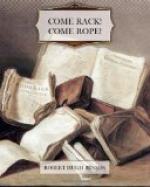The hall at Matstead was such as that of most esquires of means. Its dais was to the south end, and the buttery entrance and the screens to the north, through which came the servers with the meat. In the midst of the floor stood the reredos with the fire against it, and a round vent overhead in the roof through which went the smoke and came the rain. The tables stood down the hall, one on either side, with the master’s table at the dais end set cross-ways. It was not a great hall, though that was its name; it ran perhaps forty feet by twenty. It was lighted, not only by the fire that burned there through the winter day and night, but by eight torches in cressets that hung against the walls and sadly smoked them; and the master’s table was lighted by six candles, of latten on common days and of silver upon festivals.
There were but two at the master’s table this evening, Mr. Audrey himself, a smallish, high-shouldered man, ruddy-faced, with bright blue eyes like his son’s, and no hair upon his face (for this was the way of old men then, in the country, at least); and Mr. Anthony Babington, a young man scarcely a year older than Robin himself, of a brown complexion and a high look in his face, but a little pale, too, with study, for he was learned beyond his years and read all the books that he could lay hand to. It was said even that his own verses, and a prose-lament he had written upon the Death of a Hound, were read with pleasure in London by the lords and gentlemen. It was as long ago as ’71, that his verses had first become known, when he was still serving in the school of good manners as page in my Lord Shrewsbury’s household. They were considered remarkable for so young a boy. So it was to this company that Robin came, walking up between the tables after he had washed his hands at the lavatory that stood by the screens.
“You are late, lad,” said his father.
“I was over to Padley, sir.... Good-day, Anthony.”
Then silence fell again, for it was the custom in good houses to keep silence, or very nearly, at dinner and supper. At times music would play, if there was music to be had; or a scholar would read from a book for awhile at the beginning, from the holy gospels in devout households, or from some other grave book. But if there were neither music nor reading, all would hold their tongues.
Robin was hungry from his riding and the keen air; and he ate well. First he stayed his appetite a little with a hunch of cheat-bread, and a glass of pomage, while the servant was bringing him his entry of eggs cooked with parsley. Then he ate this; and next came half a wild-duck cooked with sage and sweet potatoes; and last of all a florentine which he ate with a cup of Canarian. He ate heartily and quickly, while the two waited for him and nibbled at marchpane. Then, when the doors were flung open and the troop of servants came in to their supper, Mr. Audrey blessed himself, and for them, too; and they went out by a door behind into the wainscoted parlour, where the new stove from London stood, and where the conserves and muscadel awaited them. For this, or like it, had been the procedure in Matstead hall ever since Robin could remember, when first he had come from the women to eat his food with the men.




